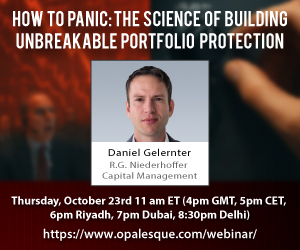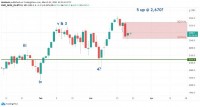|
Featured Structure: Wa'd and the completeness of Islamic markets First I want to wish our readers Ramadan Mubarak! May the peace and blessings of this month shower upon us and our families, enrich our lives and enlighten our opinions. Bernardo's opening piece mentioned divisions as he sees them in terms of philosophy and in this month's feature I wanted to focus on the divisions in terms of product. To the casual observer, Islamic Finance may seem a cohesive whole but this view is deceptive. In fact, the industry is plagued by vigorous debates and vituperative exchanges. The basis may be due to differences in underlying philosophy but on the product line, one battleground is clearly drawn: the promise (wa'd) and in particular on the purchase of such a promise. Wa'd or unilateral promise with no consideration is a concept that has been used since close to the start of institutionalized Islamic finance. 0has been used primarily alongside murabaha for purchase order prior to its more recent spinoff. Rather than a standard contract in Islamic finance ('aqd) the wa'd was seen as being 'below radar coverage', having no or relatively few standards legislated purely to its use and applicability by international bodies such as IFSB and AAOIFI. Opening new possibilities? The wa'd's applicability seemed immense, although there was initial groundwork to be laid. One criteria which had to be established was its legal enforceability under Shariah. First of all, this had to be done independently from its use in the murabaha for purchase order. While classical jurists had a wide range of opinions on this matter - from deliberate failure to uphold a wa'd being morally reprehensible (Hanafi, Hanbali, Shafi'i majority opinions), to being legally actionable subject to the promisee suffering loss due to reliance upon the promise (similar to promissory estoppel, the opinion held by majority Malikis), whereas modern jurists have for the most part said it is a cause for legal action if it is a wa'd given with specific conditions. Indeed the range of opinion is rich, for instance refer to:
While the enforceability is the subject of some debate, the wa'd was set to debut in its wildest incarnations. Limiting the use of wa'd or finding new loopholes? To be fair, jurists had determined some limits to its use, in particular the use of muwa'dah (bilateral wa'd) as a means of circumventing shariah rules prohibiting forward transactions. But the ability to distinguish between muwa'dah and wa'dan (two unilateral wa'd, wu'd plural) was the subject of some deliberation. In general bilateral wa'd were considered to be somehow independent if the two conditional wa'd (effectively options each) had different entry conditions. Shockingly, scholars seemed unaware of put-call parity; to enter a forward contract on a commodity I need not promise I will buy unconditionally at price f and you need not promise you will sell unconditionally at price f, instead I could promise to buy at price f only if the the commodity price is above f (i.e., I short a call option) and you promise you will sell at price f only if commodity price is below f (you are long a put option). Only one wa'd is enforceable at any time, but together they are a forward contract. Suddenly forward contracts become admissible in Shari'ah. With some minor twists this can be used as a means of delivering a total return swap (see Islamic Finance Resources reference links here and here). In other words, by a simple piece of trickery (or innovation) we avoid our transaction being classified a (prohibited) muwa'dah and instead classify it as a wa'dan but we manage to attain exactly the same goal. Similarly the use of third parties as intermediaries has been vetted as a means of avoiding the muwa'dah classification (in the original Deutsche Bank swap). But this ability to exchange wa'ds was a major breakthrough. Because there were no shari'ah requirements on the actual conditions in the wa'd, as well as the promised action as long as it did not compel the Muslim investor to do anything haram (forbidden) but with no such prohibition on the non-Muslim counterparty, almost anything was allowed. The German bank and others subsequently saw this as an opportunity to deliver hedge funds to Muslim investors. The Muslim investor would invest in halal assets and use the wa'd swap arrangement to swap the returns for those of virtually any underlying held by a non-Muslim investor. Hedge funds, cross-currency swaps, exotic products, even gambling stocks, liquor, and all previously prohibited investments could be delivered this way. This was in fact heralded as a major 'welfare-increasing' arrangement for Muslims who could still maintain their adherence to the letter of the law while getting financial and gaming exposures that they somehow always needed (see, e.g., Humayon Dar, Incentive Compatibility of Islamic Financing, Handbook of Islamic Finance, pp. 85-96). A Spanner in the Works: Rare Criticism The backlash was novel in Islamic Finance, but altogether needed. Sh Yusuf Talal de Lorenzo wrote a now famous white paper (see reference link) on the 'Shariah Conversion Technology', decrying the fatwa which authorized it as the Doomsday Fatwa of Islamic Finance. In particular, he identified the ability to enter into otherwise haram investments as problematic from a shari'ah perspective because he showed that the Muslim investor's monies were in fact partly being used or enabling a prohibited investment. Doomsday was telling since as he put it, now that almost everything was legitimate, there was no point in spending time devising all the complicated (and costly) structures required to make a deal halal: why bother when you could just invest in some halal asset, and swap it for any conventional product that one wished for. Limiting his criticism, Sh Yusuf did point out that as long as all the underlyings were halal, the arrangement was in fact halal as well. This criticism did not end the use of the total-return swap, but in some attempt to save face and marginally comply with the criticism, the parties involved decided to willingly avoid using the swap in the most outlandish forms. They did not feel compelled to use only strictly halal underlyings, however, and the wa'd swap has been used for 'wrapping' commodity futures, exotic derivatives, hedge funds, most certainly broad market indices, etc. This self-curtailment (see reference link for the limits the DB Islamic Structuring desk has decided to place on itself, avoiding areas termed 'too aggressive') and basically the decision not to offer 'shariah-compliant pork bellies' was not due to any reinterpretations of the intricacies of Shari'ah, but rather was based purely on brand perception. In fact, pure compliance to their own version of Shari'ah would mean that DB and other banks who now use the same structure would continue to offer any and everything under the sun with a 'Shari'ah Compliant Wrapper'. Wa'd for Sale Nevertheless, the door to radical innovation was still open. In 2004, yet another fatwa was obtained from a prominent Saudi cleric to allow them to enter into a wa'd on forex (a currency option), but only for hedging purposes. Certainly the rationale that creation of options increases the welfare (maslahah) of the muslim ummah cannot be argued with. However, the surprising part of the fatwa was that the cleric allowed them to charge a 'small fee' to offset the expense of this offering. This was in fact a first. In Islam, sales are very specific and are quite different from leases. For instance, a short-sale in a conventional sense is not possible, since the conventional short sale requires one party to borrow an asset, only later to sell it. In Islam, one cannot sell what one has merely borrowed. Sales depend on constructive possession, typically of some physical underlying (while borrowing only entitles the borrower to the usufruct rather than true ownership of the asset). Consequently there is no means to make a wa'd the subject of a sale. Nonetheless, the cleric saw fit to allow the bank to charge a fee. The actual sale of a promise is something not ever discussed as an object of sale. Hence the use of the 'fee' language. It was claimed that the structure was different from an option as it was not transferrable, but the fact that a fee was allowed meant that other than minor variations of nomenclature, one could effectively buy a promise. In fact, the Shariah compliant option was altogether worse than its conventional counterpart. For one thing, the fee was likely to be larger than an option premium, including portions to reimburse bankers, structurers, shariah scholars, salesmen and shareholders for their time and capital. All this for merely repackaging a forex call or put option and calling it a wa'd or promissory note? This fatwa has apparently been extended and there are now many banks who will explain the pros of puchasing a promise over bai al arbun (a down-payment sale, only legitimized in the Hanbali school, and one with embedded optionality), comparing the two approaches to optionality for their flexibility and transaction costs. Forex options for hedging seem innocuous enough, but the wa'd, by the fact that many scholars have allowed the underlying conditions placed on the promise to depend on non-compliant underlyings made the entire promise-for-sale concept truly extensible. If we look at the delivery mechanism for almost all Islamic structured or exotic products, we find an underlying wa'd for sale. Most intricately structured products are delivered by one of two methods, either DB's swap methodology, or through rolled murabaha contracts. The rolled murabaha is simple enough to explain. Most structured product involves a principal protected component and a risky option component. To deliver the principal protection we merely enter into a Murabaha (a markup-sale, much like a zero-coupon bond) which at maturity delivers $100. If we have rates at 5% and the maturity is 5 years, the price today is about $75. The remaining $25 is invested in an option, effectively, it will pay for a wa'd to enter a murabaha in 5Y, maturing in 5Y and 3M time, or something similarly small. The markup for this subsequent mubahaha will be (truly off-market) linked to the performance of some exotic index/structure over the first 5Y. In other words, by allowing the rolled murabaha, by effectively allowing wa'd for sale, the scholars have opened the door to virtually any cashflow for the Muslim investor. Islamic Finance in a Complete Market How did we arrive here? How did we effectively achieve the completeness of the Islamic finance marketplace? Two major steps were taken. In one case, it was a wa'd for swap, and in the other case it was a wa'd for sale. Both effectively allow consideration to be given in exchange for a promise. While scholars may term it differently, calling it a promissory note or a wa'd with a small offsetting fee, the nomenclature means little. In fact, if we allow small fees, we might as well allow Islamic Banks to offer Qard al Hassan (a 0% interest benevolent loan) with a 'small fee' to offset the expense of tying up capital for the maturity of the loan. And we might as well have the fee be equal to LIBOR x Notional or some other pertinent interest rate. More likely than not, it will be LIBOR+Significant Spread where the Spread pays for the investors' religiosity. While we are at it, we can charge a 'small fee' for late payment of a loan and ensure foreclosure upon default. Such is the nature of this slippery slope. In fact 'small fees' are the principal behind interesse, the original interest charged by Venetian and Genovese bankers for the opportunity cost of offering a loan. And we can trace the Church's acceptance of 'small fees' as the beginning of the end of the Ecclesiastical ban on usury. A survey of daily headlines will tell you where that has taken us. Suddenly, the world is open to the Islamic investor, and might lead one to question what differentiates Islamic finance? Presumably, if Islamic finance was in fact adherence to a set of principles which change our investment behavior for the sake of longer-term blessings, then Islamic financial prohibitions should genuinely lead to a constraint in our investment universe and lead to a reduction in short-term 'welfare'. In the short run at least, the constrained optima will always be less welfare-producing than the unconstrained. As we have seen though, wa'd are being used to 'complete the market', to open up all opportunities to investors without the need to observe financial ratios, non-permissible activities and other trivial guidelines. So is Islamic finance different? Or is it now the conventional dressed in new clothes? Islamic finance is different, we cannot invest in haram assets. No, we must wait three months longer for the second murabaha to pay off. Your feedback and comments are very important to us, please feel free to contact the author via email. |
Opalesque Islamic Finance Intelligence
Featured Structure: Wa'd and the completeness of Islamic markets Nikan Firoozye, Ph.D. |
|





 RSS
RSS










